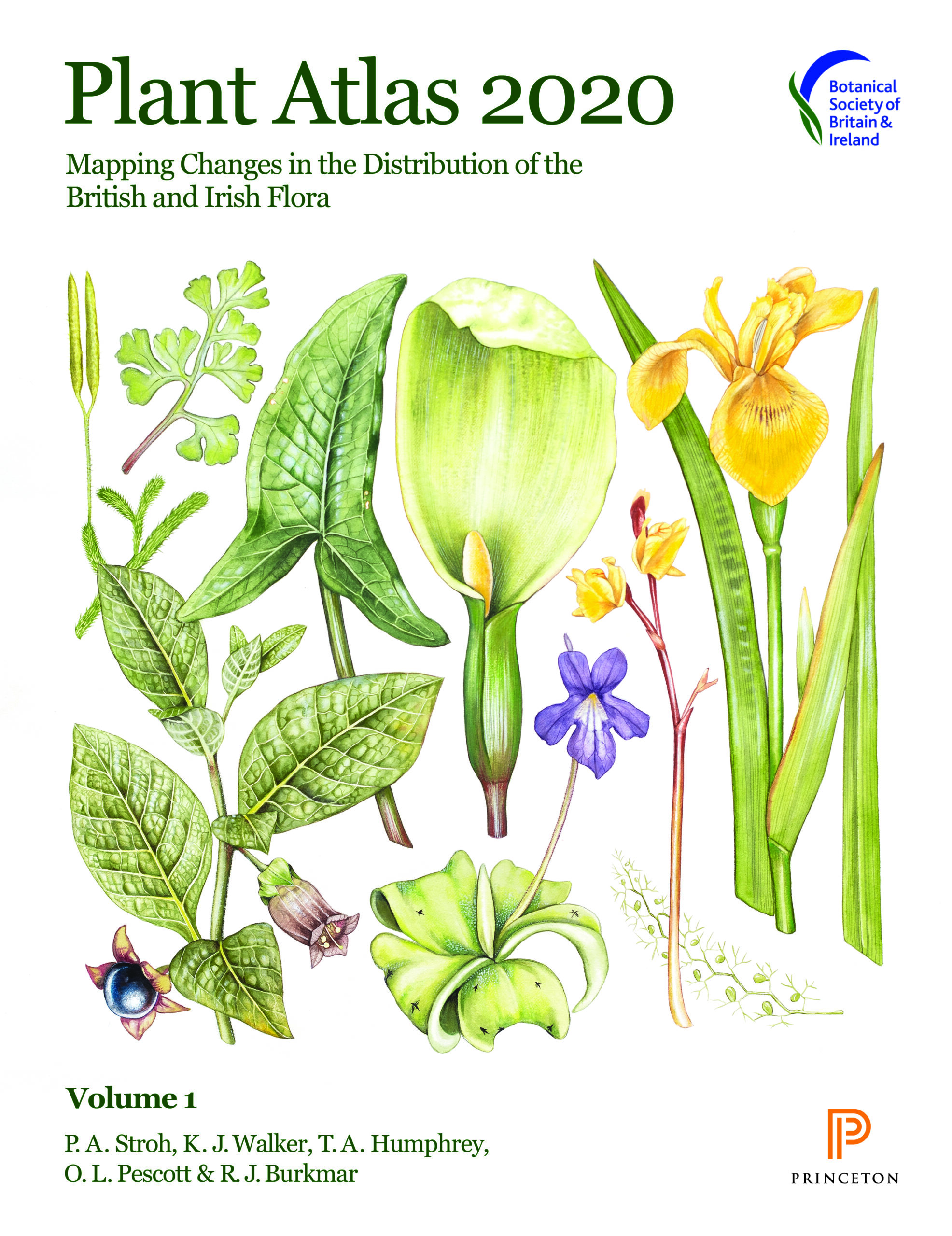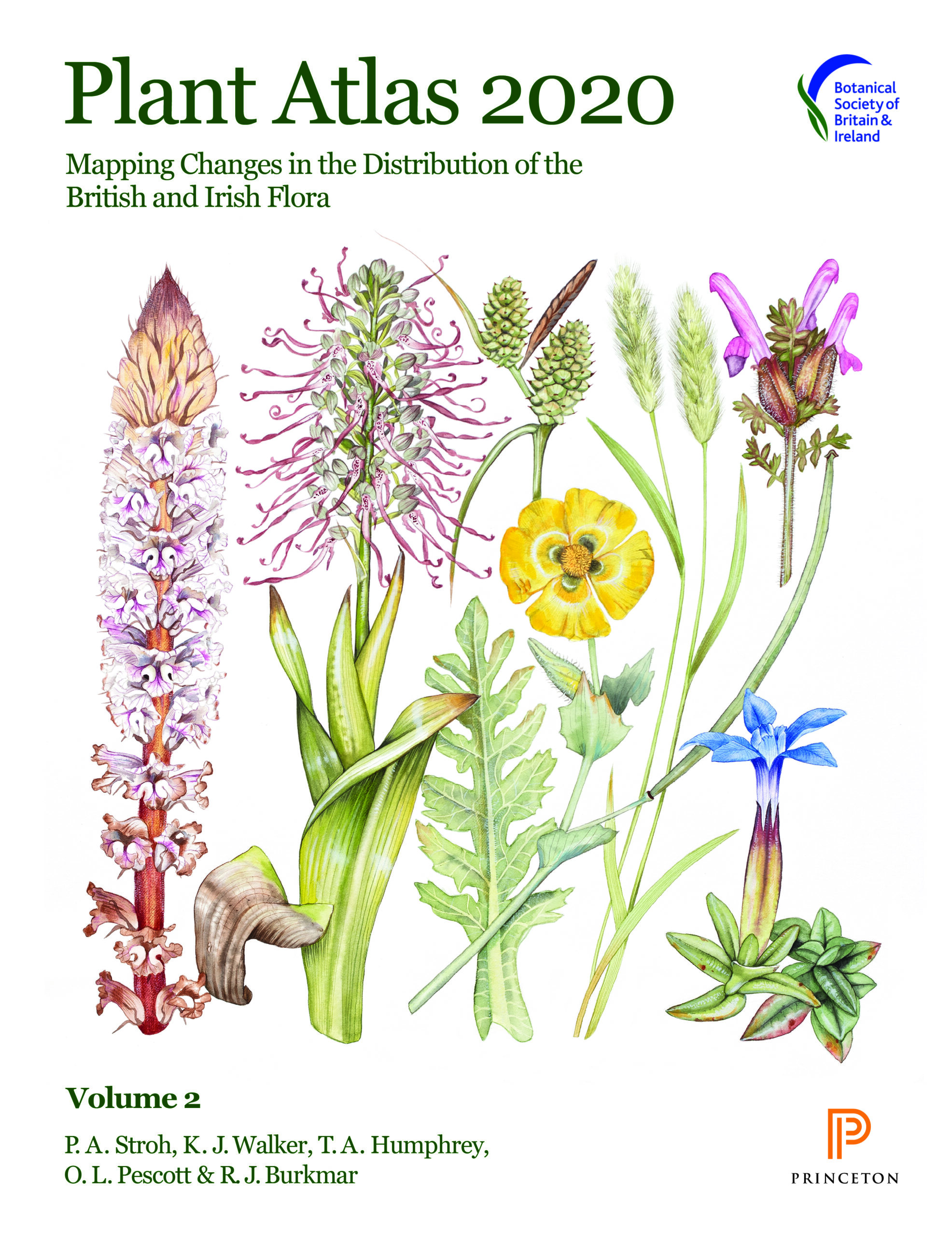Plant Atlas 2020: Mapping Changes in the Distribution of the British and Irish Flora
Plant Atlas 2020 is the most in-depth survey of the British and Irish flora ever undertaken. It builds on two previous plant distribution atlases published by the Botanical Society of Britain and Ireland in the twentieth century and will serve as an essential resource for the study and conservation of our wild plants and their vitally important habitats for decades to come.
Thousands of botanists spent 20 years recording wild and naturalised plants across Britain and Ireland. They collected more than 30 million records which fed into the Plant Atlas 2020 website, book and summary reports.
Plant Atlas 2020 website
- The Plant Atlas 2020 website features information about 3,495 native and introduced plant species
- Interactive maps display frequency and distribution at a variety of scales.
- The website provides photo galleries to help you identify that plant, information on flowering times and summarises trends - whether the plant is on the increase or in decline.
Plant Atlas 2020 book
- Plant Atlas 2020, a 2-volume printed Atlas, is available in bookshops or direct from the publishers, Princeton University Press.
- The book features introductory chapters that provide a detailed assessment of the changes to the region’s flora over the past hundred years.
- Distribution maps and accompanying text and graphics display the phenology, altitudinal range, and time-series trends for some 2,700 native, alien, and hybrid species.
- Our special offer for BSBI members (a 30% discount when ordering print copies or eBooks) closed at the end of 2023 but the book is still available to buy from Princeton University Press, from Summerfield Books & all good natural history booksellers.
- Not yet a member? Join BSBI today to take advantage of great offers on selected botany books and many other membership benefits!
Check out this glowing review of Plant Atlas 2020 by Peter Marren, published in the prestigious British Wildlife magazine.
Plant Atlas 2020 summary reports
- Britain's Changing Flora summarises the key findings from the Plant Atlas 2020 project, assessing changes since the 1950s and analysing the drivers of change, such as habitat loss, pollution and climate change.
- This press release summarises the findings in Britain
- Visit our Plant Atlas 2020 country pages for country-level press releases and to find out what the new Atlas reveals about how our flora is changing in Ireland, Scotland and Wales
Find out more: videos and FAQ
A series of Plant Atlas 2020 launches was held throughout March 2023, both online and face-to-face at locations across Britain and Ireland. Talks from the launches were recorded and the videos are now available via the Plant Atlas 2020 playlist on our YouTube channel: watch Rich Burkmar demonstrating the online Atlas; Kevin Walker summarising the Atlas findings; Julia Hanmer explaining what the Atlas means for plants, policy and people; Chris Preston looking back at previous atlases; and a selection of talks from launches in Belfast, Cambridge, Dublin, Edinburgh, Newcastle and south Wales.
The launches offered policy-makers, botanists and journalists the opportunity to submit questions to Plant Atlas 2020 authors about the findings and outputs; we have collated the responses on our Atlas Q&A page.
There was some excellent, high-profile media coverage of the Plant Atlas 2020 launches: find out more here about the TV and radio interviews, the newspaper articles and the many mentions on global websites and in partner newsletters.


Plant Atlases 1 & 2
BSBI's ground-breaking first atlas of the British and Irish flora, published in 1962, pioneered the use of ‘dot-maps’ aligned to the OS grid. Read about the influence that it had in this paper published in New Journal of Botany.
A second atlas was published in 2002, based on fieldwork carried out from 1987-1999.
Funding
BSBI are grateful to the trusts, foundations and organisations that supported the success of the Plant Atlas 2020 project and its publication, as well as all the members, supporters and individuals who donated time, expertise and financial support to the endeavour.
If you would like to provide financial support for our nationally important work going forwards, please visit our Appeal page or contact BSBI Head of Science Dr Kevin Walker or Fundraising Manager, Sarah Woods.
With particular thanks to:
- Biological Records Centre/ UK Centre for Ecology & Hydrology: the production of Plant Atlas 2020 was partly supported through Natural Environment Research Council award number NE/R016429/1 as part of the UK-SCAPE programme delivering National Capability.
- The Wildlife Trusts
- National Museums Northern Ireland
- Natural England
- National Parks and Wildlife Service
- The Naturesave Trust
- The Thriplow Charitable Trust
- The Lennox Hannay Charitable Trust
- The Seven Pillars of Wisdom Trust
- and other anonymous supporters